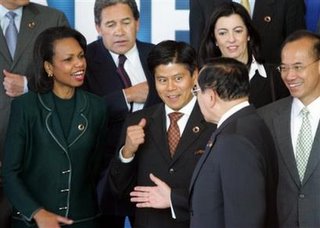Whips out at Te Rapa for Waitangi trialists
The tribunal says the inquiry "will concentrate on issues concerning the revised charter, student profile, and future direction of TWOA. Key questions will include the role of the Crown and the claimants in determining the future direction of TWOA; the Treaty responsibilities that the Crown has to the claimants; and the question of what a wananga is."
Back in March then education minister Trevor Mallard told the wananga he wanted the charter rewritten. He had already used used student profile - the fact the wananga was attracting a lot of non-Maori students - as a pretext to hold back $20 million the government had earlier agreed to loan the wananga under the terms of a previous Waitangi Tribunal claim settlement. This precipitated a cash flow crisis, giving Mallard an excuse to insert two hit men: former Te Puni Kokiri head Wira Gardiner, who went on the council's board; and Brian Roche from accounting firm PriceWaterhouseCoopers, who went in as Crown observer and then became Crown manager, with complete control over finances.
Since July, when Gardiner got most of the wananga's council to "step aside" as the only way to prevent Mallard from installing a commissioner, the Crown's agents have been running the show, slashing courses and riding roughshod over what the wananga's founders would consider their rangatiratanga.
The tribunal has already discussed rangatiratanga in its Wananga Capital Establishment Report:
Rangatiratanga involves, at the very least, a concept of Maori self-management. … The wananga that have been recognised as tertiary education institutions have all developed out of the efforts of Maori iwi groups to provide tertiary education to, in the first instance, their own people; in the second instance, Maori students; and, in the third instance, anyone who wishes to embrace this particular form of education. As such, the efforts of these tribal groups to create and sustain tertiary education institutions are a vital exercise of rangatiratanga. The establishment of wananga as tertiary education institutions recognised by the State represents an attempt to engage actively with the Crown in the exercise of rangatiratanga in the management of new forms of tribal and Maori education. The Crown's Treaty obligation is to foster, support, and assist these efforts. In doing so, the Crown needs to ensure that wananga are able to remain accountable to, and involved in, the communities that created them.
With those kind of statements behind it, the Government looks on course for a hiding on this claim.
The new tertiary education minister, Michael Cullen, is well aware of the mess Mallard and Gardiner left him.
In a letter to wananga chairman Craig Coxhead earlier this month, Cullen said the current governance by the purged council "may not be lawful".
"While I appreciate that the council took decisions on 19 July 20005 to reduce the council to a group of five with the objective of improving the governance of the organization, I am concerned that that course of action may be of questionable legal validity and, as a result, that the governance of the wananga may be increasingly problematic," Cullen said.
If the wananga does not have a legal governance structure, it may have problems securing funding for 2006. Tertiary institutions must submit a profile of courses and likely student numbers to the Tertiary Education Commission, which doles out the dollars.
Gardiner, Coxhead and Roche have made plans to dramatically slash the size of the wananga, dumping some courses because they are not paying their way, others because Mallard didn't like them, such as the one which trained people in the theory and practice surrounding traditional canoes. Trade training and business courses are also off the menu. While it can be argued other tertiary institutions provide such courses, the wananga's success has come in large part from its ability to attract to education people who other tertiary institutions have been unable to reach.
The Crown management has not solved the wananga's financial crisis, although the government is now providing loans. Cullen said the wananga is expected to lose $12 million this year (up from the $4 million originally projected).
Most of that loss is due to a reduction in EFTS (Equivalent Full Time Students) to about 26,500. The Tertiary Education Commission funded for 28,000 EFTS, so the wananga may have to pay back $10 million.
While some of the shortfall is due to low unemployment (let us not forget the continued strong economy, driven by high prices for dairy products, might have faltered if the wananga had not provided tens of thousands of work-ready people, especially in the provinces), attacks by government and opposition politicians have also tarnished the wananga's brand. Unsubstantiated allegations about low quality courses, and fears courses may be axed or interrupted, may have artificially lowered student numbers.
The longer the Crown continues to control the wananga, the more its problems become the government's rather than the wananga's.
Cullen's solution is to pretend the "resignations" never happened and get Coxhead to reconvene the council with all members whose terms have not expired. That includes Crown appointees Coxhead, Gardiner, Tania Hodges and Bruce Martin, current member Richard Batley, as well as Mana Forbes, Carol Nin and Napi Waaka. There was also a question over whether wananga founder Rongo Wetere was lawfully suspended as Tumuaki, and therefore whether he can sit on council.
Without waiting for elections for staff and student representatives which would bring it up to full strength, Cullen wanted the reconvened to ratify all actions taken by the unlawful rump, and maybe to then to delegate its powers back to a subcommittee.
Rather than try this option (which would probably meet resistance from wananga supporters), Gardiner and co are still trying to sack Wetere.
The parties hoped matters would be clarified by a High Court case taken by the council members who were pushed aside. However, in a messy and confusing judgment, Justice Frater refused to determine two critical issues: whether the current five-member council is valid; and whether the plaintiffs can continue in office after their terms expire.
"I hope that there is still the possibility that, with appropriate advice, the parties might be able to work through these and the other issues of concern to them to reach a common accord," chirped the beak. The judgment has been appealed.




